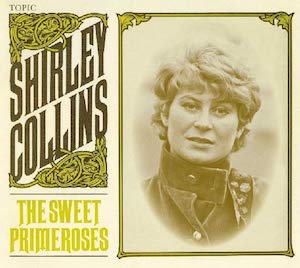 Shirley Collins: The Sweet Primeroses (Topic Treasures Series)
Shirley Collins: The Sweet Primeroses (Topic Treasures Series)
Topic Records – 22 March 2019
AL Lloyd semi-rhetorically asked if it was traditional to use a portative organ as an accompaniment to English folk song. His answer was for the listener to judge for themselves and 52 years later we can do it again. The little pipe organ belonged to Dolly Collins and she used it to accompany her sister Shirley Collins on the album The Sweet Primeroses, a 1967 release that Topic Records have reissued as a Deluxe CD as part of their Topic Treasures Series celebrating 80 years of independent music production.
But why re-release The Sweet Primeroses? It could be that old cliché that it is of its time and thus represents that time. But it isn’t and it doesn’t. As with the other Deluxe releases, this is an important album because it is at once timeless and also representative of a tradition that stretches back centuries and also forwards to beyond the now. You only need to read of the number of singers of today who cite Shirley Collins as an influence and as an exemplar of the clear, direct style to appreciate her importance in the transmission of folk song.
In more detail, there are a number of other reasons why this album is important. Firstly the voice. As I have said before, there is no doubt about the clarity and leaving the words to tell the tale. The Sweet Primeroses is made even more interesting when you learn that just before recording, Shirley had had her tonsils out.
Continuing the tradition is another key reason for selecting this album. Recorded work is always only a snapshot, a picture of the time, but it is a snapshot that offers the singer of today an opportunity to learn the song in the oral tradition. It may not be learning it at your mother’s knee or from nights at the pub, but you can learn it and then pass it on.
And then there are the connections. Not only are the songs passed on but there are also the links to other singers and to the past, to the history of the words and the music. The Copper Family, also natives of Sussex passed on several songs and here are Spencer the Rover, The Babes in the Wood and the title track The Sweet Primeroses (and don’t lose that ‘e’!). Despite not being a great fan of Ewan McColl’s singing style (nor his wooing technique) none of that gets in the way of a good song and Shirley learned The Cruel Mother, a ‘cautionary ballad’, from him over a decade before this recording.
Many of the tracks are ones learned from field recordings by Peter Kennedy, among them The Rigs of Time, The Streets of Derry and Higher Germanie. Field recording with Alan Lomax early in her career clearly showed how important it was to save these songs and what a resource these would be for the future. And this also demonstrated that Shirley has always found the song in its historical context important and not just only for its own sake. She has also managed to retain that traditional clarity even when paired with more modern – or left field – instrumental accompaniment.
Which, in a way, brings me back to the pairing of Shirley and her sister Dolly. Shirley recounts in All In The Downs (2018) how The Sweet Primeroses was their ‘first outing together’. Produced by her then-husband John Marshall, the working with her sister was ‘wonderful’. The pipe organ was a reproduction of a 1689 instrument and instantly appealed to the sisters and proved to be doubly inspirational, for ‘Dolly to write for, and me to sing with’. All Things Are Quite Silent easily demonstrates the synergy between singer and player, nothing getting in the way of the song but everything building it, echoing, leading or responding.
This re-release is augmented by the addition of the 1963 EP Heroes of Love (or Heroes in Love according to Shirley). This was the first of five EPs of that period and it was the first time that Shirley felt she had made ‘something worthy’. Placing these songs at the end of The Sweet Primeroses provides an interesting comparison and shows what a difference four years can make, the earlier recordings revealing a younger voice without the surety of the later one, despite the recent operation.
To choose Shirley Collins as one of the three first releases of this celebratory run by Topic Records (the other two being Anne Briggs and Martin Simpson) was a given. As with Anne Briggs, Shirley’s unadorned style was new, refreshing and at the same time, made the song the important feature. Shirley has often expressed how important it is for the words to tell the story and the tale not to be lost in a paroxysm of vocal contortions. Even when surrounded by the nascent folk-rock of the Albion Band, Shirley’s voice rings out true, true to the tune and true to the song. It still rings out true today and what a most fitting album to present to a new generation to listen to and learn from.
